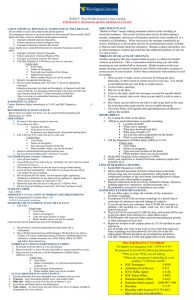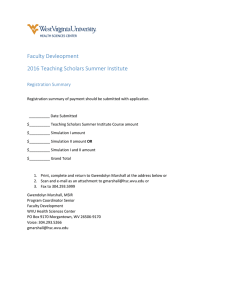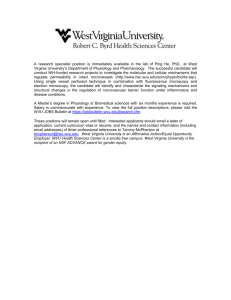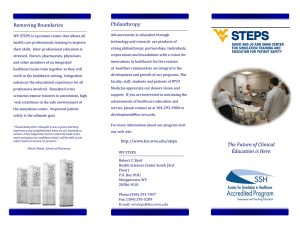West Virginia University Health Sciences Center Campus Emergency Preparedness Instructions for
advertisement
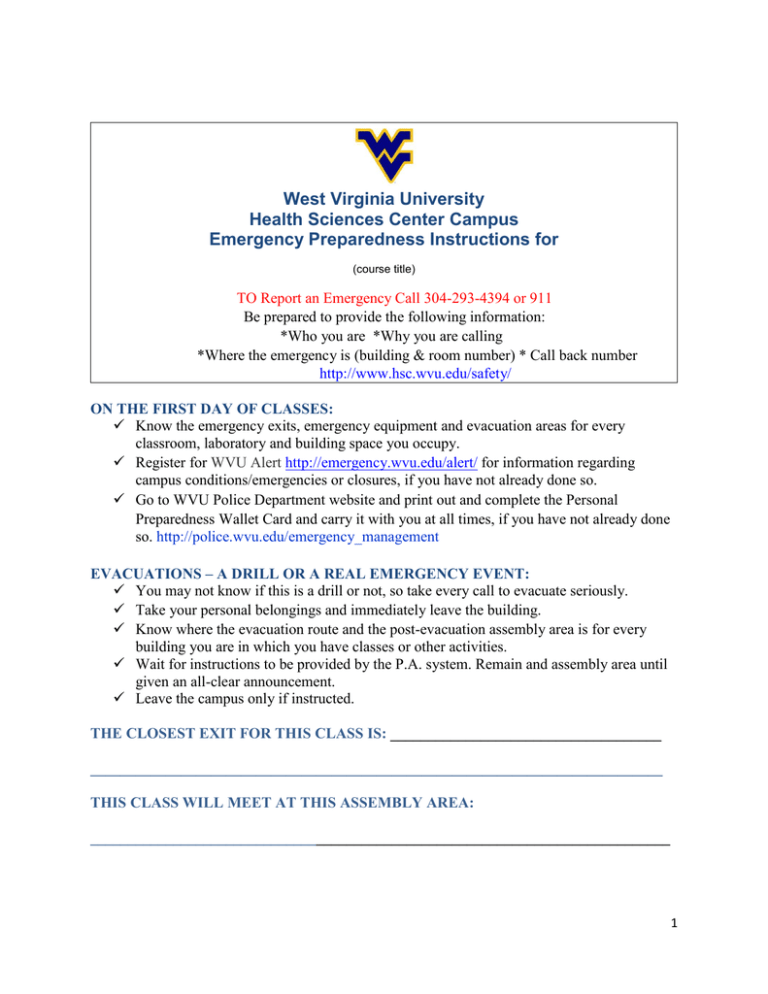
West Virginia University Health Sciences Center Campus Emergency Preparedness Instructions for (course title) TO Report an Emergency Call 304-293-4394 or 911 Be prepared to provide the following information: *Who you are *Why you are calling *Where the emergency is (building & room number) * Call back number http://www.hsc.wvu.edu/safety/ ON THE FIRST DAY OF CLASSES: Know the emergency exits, emergency equipment and evacuation areas for every classroom, laboratory and building space you occupy. Register for WVU Alert http://emergency.wvu.edu/alert/ for information regarding campus conditions/emergencies or closures, if you have not already done so. Go to WVU Police Department website and print out and complete the Personal Preparedness Wallet Card and carry it with you at all times, if you have not already done so. http://police.wvu.edu/emergency_management EVACUATIONS – A DRILL OR A REAL EMERGENCY EVENT: You may not know if this is a drill or not, so take every call to evacuate seriously. Take your personal belongings and immediately leave the building. Know where the evacuation route and the post-evacuation assembly area is for every building you are in which you have classes or other activities. Wait for instructions to be provided by the P.A. system. Remain and assembly area until given an all-clear announcement. Leave the campus only if instructed. THE CLOSEST EXIT FOR THIS CLASS IS: ____________________________________ ____________________________________________________________________________ THIS CLASS WILL MEET AT THIS ASSEMBLY AREA: _____________________________________________________________________________ 1 FIRE/SMOKE: Evacuate if fire alarm sounds in your area. If you discover a fire: Activate fire alarm Close doors as you leave Follow the exit signs and use the stairs if needed. Do not use elevators. Evacuate to your departments’ designated meeting place Call 3-4394 or 9-911 after you are in a safe area. Calmly State: Wait for instructions to be provided by the P.A. system. Remain and assembly area until given an all-clear announcement. Leave the campus only if instructed EARTHQUAKE: If it is severe enough to move furniture, DROP, COVER and HOLD ON: Most people are injured trying to run out of a building in an earthquake. It is best to immediately seek shelter (under a desk or table, if possible) cover your head and hold on. Evacuate if directed, if you smell smoke or see fire, if there is a fire alarm, or you feel the building is unsafe and it is safe to do so. Be prepared for AFTERSHOCKS GAS ODOR (NATURAL, PROPANE, AMMONIA): Turn off open flames. Turn off the gas if it is safe to do so. Normally, the valve must be turned clockwise to close it. The emergency shutoff can also be used to stop gas from leaking. Leave the area immediately! Alert others to evacuate the area where you suspect the gas is leaking. Do not operate the fire alarm. Do not operate lights, appliances, telephones, cell phones or any other electric appliances. Sparks from these sources can trigger an explosion or fire. Report the leak after you are in a safe area to 3-4394 or 9-911. Do not return to building or area until “All Clear” has been issued. SUSPICOUS ODOR: Call 3-4394. EMERGENCY EVACUATION OF MOBILITY IMPAIRED PERSONS: Refer to Individual Evacuation Plan. Call 3-4394 if you require assistance. INJURY/DEATH OF STUDENT, STAFF, OR FACULTY: Call 9-911. Calmly state: 2 o Your Name o Nature of emergency o Type and exact location of injury o Phone number where you can be reached o Listen for and follow instructions from 9-911 dispatchers Stay with the injured person if it is safe to do so, until Emergency Medical Services arrives. Contact University Authorities (Deans, Directors, building supervisor, instructors, resident assistants, etc.), HSC Safety Office at 3-0952, and follow their instructions. VIOLENCE/DISTURBANCE/CRIME: Do not get involved unless it is for self-defense. Protect yourself, i.e. leave the area if possible or secure yourself in a room. Once you are in a safe area, call the Department of Public Safety (DPS) at 3-3136. Calmly state: Your Name Nature of emergency, i.e. physical characteristics, weapons, etc. Exact location of disturbance. Phone number where you can be reached. ACTIVE SHOOTER IS IN YOUR VICINITY: Quickly determine the most reasonable way to protect your own life. Evacuate – leave belongings behind, leave your hands visible Hide Out – Hide in an area oft of the active shooter’s view Lock doors and block entry to our hiding place Take Action – As a last resort and only when your life is in danger, attempt to Review WVU University Police Department Active Shooter Poster here: http://police.wvu.edu/r/download/85873 SHELTER IN PLACE Shelter in Place” means seeking immediate shelter inside a building or university residence. This course of action may need to be taken during a tornado, earthquake, and release of hazardous materials in the outside air, or a criminal/civil disturbance. When you receive the message immediately go inside a building to a safe location and use all communication means available to find out more details about the emergency. Remain in place until police, fire, or other emergency response personnel provide additional guidance or tell you it is safe to leave There may be situations where it is imperative that you seek shelter and not leave the building. If directed, or you feel it is best to do so, seek shelter in a room with a lock. Turn off the lights and silence all cell phones. Hide as best as possible until the all clear signal has been given by authorities. If you cannot safely hide or escape, be prepared to take action to protect yourself. 3 THREATS OF OR ACTS OF VIOLENCE: Another emergency that may require shelter-in-place is a threat of criminal violence or actual acts. This is a precaution aimed to keep you safe while remaining in your resident hall or classroom. Shelter-in-place in this case means securing your current location by use of locks, barricades, or means to restrict access to your location. Follow these instructions when notified of such an incident: When an alert is made, secure your room by locking the door, barricades, or other means to restrict access to your area. You should avoid methods that use your body to restrict access. Avoid window openings. Stay low to the floor. Listen to the radio; check text messages or email for specific details. If you are outside, take cover where you are until it is safe to enter a facility. Stay where you are until you are told it is safe to get back on the road. Be aware that some roads may be closed or traffic detoured. University Police will respond with rapid deployment of officers to address the incident. BOMB THREAT: Try to keep the caller on the phone. Obtain as much information as possible including: Location of bomb? When will it explode? What does the bomb look like? What type of bomb is it? Are you (the caller) responsible for the bomb? What is your name/address? Call the Department of Public Safety (DPS) at 3-3136. Calmly state: A bomb threat checklist can be found here: http://police.wvu.edu/r/download/74603 Notify HSC Dispatch of the situation at 3-4394. Notify your supervisor or nearest University authority (supervisor, instructor etc.). LOSS OF BUILDING UTILITIES: Notify HSC Dispatch at 3-4394. Advise dispatch personnel of known critical areas at this time. Critical areas may be research experiments, refrigerated or air- conditioned locations or any area where a prolonged power failure could adversely affect health or property. Wait for instructions from University Authorities (Deans, Directors, building supervisor, instructors, resident assistants, etc.). Be prepared to evacuate if circumstances necessitate. 4 SUSPICIOUS LETTER OR PACKAGE: Do not shake, open, or empty the contents of any suspicious envelope or package. If unopened, PLACE the envelope or package in a plastic bag or some type of container to prevent leakage of contents. If you do not have any container, then COVER the envelope or package with anything (i.e., paper, trash can, etc.) and do not remove this cover. Then LEAVE the room and CLOSE the door, and section off the area to prevent others from entering (i.e., keep others away). WASH hands with soap and water to prevent spreading any powder or other substances to your face. Report the incident to the campus police at 3-3136 and then to your supervisor. List all people who were in the room or area when this suspicious letter or package was first observed. Give this list to the law enforcement officials for follow-up investigations and advice. Call HSC Dispatch at 3-4394 and update them on the situation. LARGE CHEMICAL, BIOLOGICAL, RADIOLOGICAL SPILL/RELEASE: Do not inhale or come into contact with spilled material. Use emergency showers or eyewash stations to flush material from yourself. Attempt to identify material if possible. 2. Follow Laboratory Chemical Hygiene Plan. 3. Evacuate if necessary (activate fire alarm). Call HSC Dispatch at 3-4394 once you are in a safe area. Calmly state: Approximate amount/quantity Report to designated meeting assembly area. Do not reenter building until “All Clear” is given by appropriate personnel. Laboratory personnel can clean up the majority of chemical spills that occur in the lab. If a hazardous material spill is less than one liter and has a hazard rating below 2 follow procedures found here: http://www.hsc.wvu.edu/safety/Laboratory-Safety/SpillResponse/Small-Spills RADIOLOGICAL SPILLS: Contact Radiation Safety immediately at 3-3413 and HSC Dispatch at 3-4394. HOUSEKEEPING & MAINTANENCE: Report non-toxic spills, wet floors, etc. by contacting Housekeeping and Maintenance at 3-4394. 5
